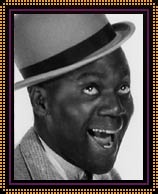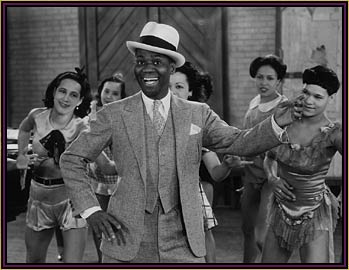 As a child Robinson worked in racing stables, nursing a desire to become a jockey. He danced for fun and for the entertainment of others, first appearing on stage at the age of eight. Three years later he decided that dancing was likely to prove a more lucrative career than horseback riding. He became popular on the black vaudeville circuit and also appeared in white vaudeville as a “pick,” from pickaninny, where his dancing skills gave a patina of quality to sometimes second-rate white acts. As his reputation grew, so did his prominence in show business. In 1921 while working at the Palace in New York, he danced up and down the stairs leading from the stage to the orchestra pit and out of this developed his famous “stair dance.” Although Robinson was not the first to dance on stairs, he refined the routine until it was one of the most spectacular events in the world of vernacular dance.
As a child Robinson worked in racing stables, nursing a desire to become a jockey. He danced for fun and for the entertainment of others, first appearing on stage at the age of eight. Three years later he decided that dancing was likely to prove a more lucrative career than horseback riding. He became popular on the black vaudeville circuit and also appeared in white vaudeville as a “pick,” from pickaninny, where his dancing skills gave a patina of quality to sometimes second-rate white acts. As his reputation grew, so did his prominence in show business. In 1921 while working at the Palace in New York, he danced up and down the stairs leading from the stage to the orchestra pit and out of this developed his famous “stair dance.” Although Robinson was not the first to dance on stairs, he refined the routine until it was one of the most spectacular events in the world of vernacular dance.
Toward the end of the decade, though he was now 60 years old, he was a huge success in the smash-hit production of Lew Leslie’s “Blackbirds of 1928.” In the mid-’30s he appeared at nightclubs in revues, musical comedies, and other stage shows, among which was “Hot Mikado.” He was so active in these years that he sometimes played different shows in different theaters on the same night. Robinson had no doubts that he was the best at what he did, a self-confidence that some took to be arrogance and that was mixed with a sometimes brooding depression at the fact that, because he was black, he had to wait until he was in his sixties before he could enjoy the fame and fortune given to less talented white dancers. In fact, he appears to have been a remarkably generous man and in addition to his massive workload, he never refused to appear at a benefit for those artists who were less successful or ailing. It has been estimated that in one year he appeared in a staggering 400 benefits. In 1930 Robinson had made a film, DIXIANA, but it was not until he went to Hollywood in the middle of the decade that he made a breakthrough in this medium.
Bill “Bojangles” Robinson
- "All in Fun"
- "Blackbirds of 1928"
- "Brown Buddies"
- "The Hot Mikado"
- "Memphis Round!"
- Dorothy Fields
- Charles Strouse
He danced in a string of popular films, including some with Shirley Temple. By 1937 Robinson was earning $6,600 a week for his films, a strikingly high sum for a black entertainer in Hollywood at the time. In 1943 he played his first leading role in STORMY WEATHER, an all-black musical in which he starred opposite Lena Horne. Despite being in his early seventies when he made the film, he performed his stair dance and even if he was outclassed by the Nicholas Brothers, his was a remarkable performance. In addition to dancing, Robinson also sang in a light, ingratiating manner, memorably recording “Doin’ the New Low-Down” in 1932 with Don Redman and His Orchestra. Although his high salary meant that he was estimated to have earned more than $2 million during his career, Robinson’s generosity was such that when he died in November 1949 he was broke. Half a million people lined the funeral route of the man who was known with some justification as the Mayor of Harlem. In 1993, a show entitled “Bojangles,” with a book by Douglas Jones and a score by Charles Strouse and the late Sammy Cahn, was being workshopped in various provincial theaters.
FURTHER READING:
MISTER BOJANGLES, Jim Haskins and N. R. Mitgang.
Source: Biographical information provided by MUZE. Excerpted from the ENCYCLOPEDIA OF POPULAR MUSIC, edited by Colin Larkin. © 2004 MUZE UK Ltd.
Photo credits: Photofest


